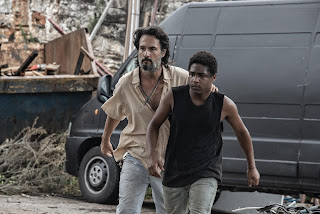Movie Review - 7 Prisoners
The last time that a live-action film from Brazil was nominated at the Oscars was City of God (2003) at the 76th Academy Awards. It was up for four major prizes, including Best Director for Fernando Meirelles. Meirelles is now a 66-year-old filmmaker who was the producer for Sócrates. With the exception of Sócrates centering on a young Black Brazilian living in poverty, one might not assume that Meirelles was behind it. This film feels a little bit closer to Meirelles, closer to the themes of City of God, if not its look and style. In terms of its images, this film is more akin to Ramin Bahrani (Man Push Cart and Chop Shop), which makes sense given that Bahrani is the other major producer on this film and given that Moratto worked on Bahrani's Goodbye Solo (2009), made in North Carolina where Moratto went to school. That style is neorealism.
Christian Malheiros was the titular star of Sócrates, which was his screen debut. He also stars here as Mateus, a 18-year-old, Black Brazilian who lives with his elderly, single mother and two sisters in Catanduva, which is a state in southern Brazil. Mateus' family is poor and his mother barely gets by with her meager farm work. At the beginning of the film, he's having one last meal with his family before he packs up and leaves. He gets into a van with three other teenage boys and is taken to São Paulo, which is his first time in the big city or any city. He hopes to make money to send back to his family and start making a better life for himself.When he gets to São Paulo, he's taken to a scrapyard or a place for metal junk. He and the three other teens have to learn to strip car parts and other things for its copper or elements. Malheiros' character in Sócrates worked in a scrapyard too. Bahrani's character in Chop Shop was a Latino working in a scrapyard as well. If anything, this film could be a spiritual sequel to Chop Shop, but instead of New York, this film is set in São Paulo. Bahrani's 2008 film was about how impoverished people can be forced to do things they might not want to do, such as prostitution. Here, it's human trafficking. If one wonders how a person can start down that road, this film provides the perfect narrative for such.
Rodrigo Santoro (300 and Love Actually) co-stars as Mr. Luca, the man who runs the scrapyard where the teenage boys work. He has them living together in a room in the back of the scrapyard with two bunk beds. It's not great accommodations. He has them working overtime. He doesn't pay them, even after weeks go by. He seems like a guy who is going to provide them with a fair opportunity, but it eventually is revealed that he's simply exploiting them. He very quickly becomes a tough taskmaster who becomes no different from a warden at a prison.The film then becomes like those about men locked in some place, such as Cool Hand Luke (1967) or One Flew Over the Cuckoo's Nest (1975). Yet, the film is also in ways like 12 Years a Slave (2013) where Mr. Luca is very much the same as a slave-master. Calling him a warden might be too easy or too nice. A warden oversees people who have been convicted of crimes. Here, the boys aren't guilty of anything, except being poor. Anyone who doesn't believe that slavery still doesn't exist in the 21st century and even in an industrialized nation like Brazil, this film is proof that it does. I don't know what the actual statistics are, but this film makes it feel absolutely real. There's nothing incredulous about Moratto's film. It's practically perfect.
7 Prisioneiros.
Rated R for language, some violence and a sexual reference.
Running Time: 1 hr. and 34 mins.
Available on Netflix.













Comments
Post a Comment